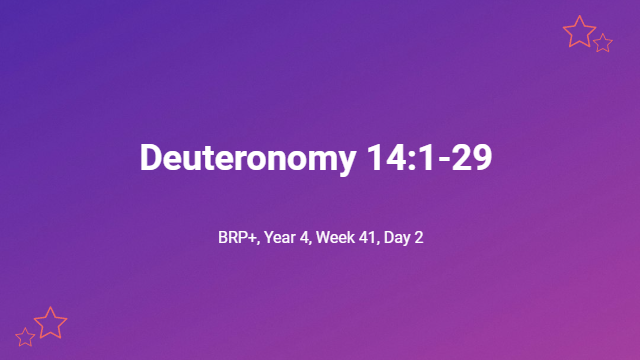Deuteronomy 14:1-29
Q.1. How would the dietary restrictions help Israel to remember the Lord? What message was given to the nations by their eating habits and health? – (Dt.14:1-21)
God had a special purpose for His people – 12 “Then it shall come about, because you listen to these judgments and keep and do them, that the Lord your God will keep with you His covenant and His lovingkindness which He swore to your forefathers. 13 He will love you and bless you and multiply you; He will also bless the fruit of your womb and the fruit of your ground, your grain and your new wine and your oil, the increase of your herd and the young of your flock, in the land which He swore to your forefathers to give you. 14 You shall be blessed above all peoples; there will be no male or female barren among you or among your cattle. 15 The Lord will remove from you all sickness; and He will not put on you any of the harmful diseases of Egypt which you have known, but He will lay them on all who hate you (Dt.7:12-15). To inherit such blessing, they were to live as God’s people – For you are a holy people to the Lord your God, and the Lord has chosen you to be a people for His own possession out of all the peoples who are on the face of the earth (Dt.14:2). Today, the dietary laws given to Israel before hygiene was understood and food could be refrigerated, still make a lot of sense. The requirement of obedience equally applies to us if there are matters that we may not understand or are unable to explain. Israel’s unique lifestyle and health standards would underscore to the surrounding nations that they were a special people to God.
Q.2. What was the point of giving God this tithe? How would bringing their tithes help the nation to stay faithful? – (Dt.14:22-23)
The tithe was one tenth. The first tithe – of the seed of the land or of the fruit of the tree is the Lord’s; it is holy to the Lord (Lev.27:30) and belonged to the Levites alone (Num.18:21 & 24). Giving a tenth required families to consider their increase and express gratitude to God. It helped them to focus on God. Many generations later, after Moses, God would designate Jerusalem as the place where the tithe was to be brought (Dt.14:23 c.f. Ps.48:1-3; 132:13-14). The Temple was there, as were God’s representatives. The people were to bring their tithes of grain, wine, oil, and firstlings of their herds and flocks – so that you may learn to fear the Lord your God always (Dt.14:23). The Levites were rostered on, to play and teach Israel songs of praise to God.
Q.3. What was unique about this tithe? Who was to benefit from the giving of the tithes and why? – (Dt.14:24-29)
The tithe specified in these verses was a second tithe to be used for the celebration of the festivals at the sanctuary (Dt.14:23-26). This was in addition to the Levitical tithe given to support the priesthood (see Q.2). They could bring their offerings, or trade them for money – You may spend the money for whatever your heart desires: for oxen, or sheep, or wine, or strong drink, or whatever your heart desires; and there you shall eat in the presence of the Lord your God and rejoice, you and your household (Dt.14:26). This was not a mean-spirited or legalistic practice. It was gracious and generous, and brought joy to the families of Israel. Doubtless, the children would love these family celebrations. However, it was also very much about others. The Levites were not to be neglected. The needy and defenceless were to be cared for – The Levite because he has no portion or inheritance among you, and the alien, the orphan and the widow who are in your town, shall come and eat and be satisfied, in order that the Lord your God may bless you in all the work of your hand which you do (Dt.14:29). What a contrast to the selfish consumerism of our day. The hospitality would be provided out of God’s grace and generosity. Rather than being an impost, the partaking of the tithe brought a gaiety and joy into the lives of the Israelites and their children. It raised the status of all members of the society. Money-changers would turn God’s house into a robbers’ den in Jesus’ day (Mt.21:13).

